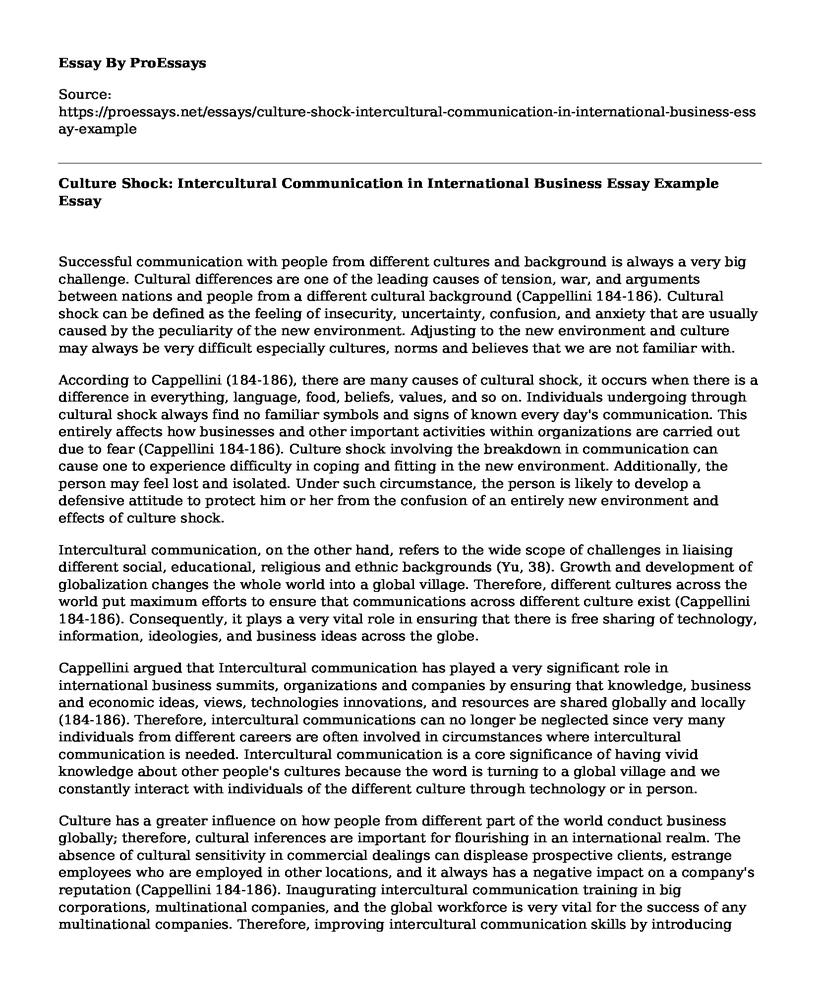Successful communication with people from different cultures and background is always a very big challenge. Cultural differences are one of the leading causes of tension, war, and arguments between nations and people from a different cultural background (Cappellini 184-186). Cultural shock can be defined as the feeling of insecurity, uncertainty, confusion, and anxiety that are usually caused by the peculiarity of the new environment. Adjusting to the new environment and culture may always be very difficult especially cultures, norms and believes that we are not familiar with.
According to Cappellini (184-186), there are many causes of cultural shock, it occurs when there is a difference in everything, language, food, beliefs, values, and so on. Individuals undergoing through cultural shock always find no familiar symbols and signs of known every day's communication. This entirely affects how businesses and other important activities within organizations are carried out due to fear (Cappellini 184-186). Culture shock involving the breakdown in communication can cause one to experience difficulty in coping and fitting in the new environment. Additionally, the person may feel lost and isolated. Under such circumstance, the person is likely to develop a defensive attitude to protect him or her from the confusion of an entirely new environment and effects of culture shock.
Intercultural communication, on the other hand, refers to the wide scope of challenges in liaising different social, educational, religious and ethnic backgrounds (Yu, 38). Growth and development of globalization changes the whole world into a global village. Therefore, different cultures across the world put maximum efforts to ensure that communications across different culture exist (Cappellini 184-186). Consequently, it plays a very vital role in ensuring that there is free sharing of technology, information, ideologies, and business ideas across the globe.
Cappellini argued that Intercultural communication has played a very significant role in international business summits, organizations and companies by ensuring that knowledge, business and economic ideas, views, technologies innovations, and resources are shared globally and locally (184-186). Therefore, intercultural communications can no longer be neglected since very many individuals from different careers are often involved in circumstances where intercultural communication is needed. Intercultural communication is a core significance of having vivid knowledge about other people's cultures because the word is turning to a global village and we constantly interact with individuals of the different culture through technology or in person.
Culture has a greater influence on how people from different part of the world conduct business globally; therefore, cultural inferences are important for flourishing in an international realm. The absence of cultural sensitivity in commercial dealings can displease prospective clients, estrange employees who are employed in other locations, and it always has a negative impact on a company's reputation (Cappellini 184-186). Inaugurating intercultural communication training in big corporations, multinational companies, and the global workforce is very vital for the success of any multinational companies. Therefore, improving intercultural communication skills by introducing intercultural communication training among employees will enhance their personal marketability. This will ensure that all employees meet the intercultural collaboration requirements valued by global business (Yu, 38).
Conclusion
Increase in the organization and corporate activities of outsourcing employees from different parts of the world and increase in international business demands employers and managers to grip the knowledge of intercultural and multicultural communication skills. The more peoples adapt and adjust with intelligence and cultural sensitivity to the requirement of their surrounding, the more multinational companies, and big corporations will get what they definitely need for their success-a culturally competent individuals and sought-after business professionals that will work together in unity and cooperation.
Works cited
Cappellini, Marco. "Introducing Language and Intercultural Communication". Language And Intercultural Communication, vol 15, no. 1, 2015, pp. 184-186. Informa UK Limited,
Yu, R. Cultural training has global appeal: working as a team or getting a deal done takes understanding. USA Today, 2009. p.3B.
Cite this page
Culture Shock: Intercultural Communication in International Business Essay Example. (2022, Sep 11). Retrieved from https://proessays.net/essays/culture-shock-intercultural-communication-in-international-business-essay-example
If you are the original author of this essay and no longer wish to have it published on the ProEssays website, please click below to request its removal:
- Union Community Health Centre
- Walmart Versus Competitors in Leadership Styles - Management Essay Sample
- Minority Influence and Social Change Essay Example
- Canadian Definition of Gender Essay
- Profit Before Principle at Enron Paper Example
- Health-Related Education and Experience Paper Example
- Essay Example on Effective Schedule Management: Prioritize Time & Resources







